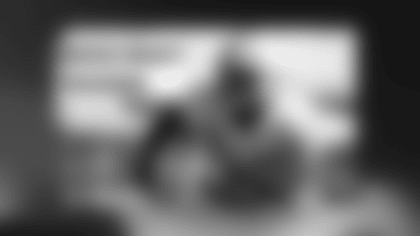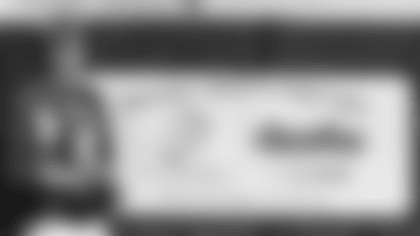The Patriots are in the dark days of the NFL calendar, but one more move before summer break solidified personnel chief Eliot Wolf's roster-building approach this offseason.
With the two sides nearing an agreement at minicamp earlier this month, lead-back Rhamondre Stevenson signed a four-year contract extension worth $17 million in guarantees last week. Stevenson is viewed as the team's starting running back and will be featured heavily in new offensive coordinator Alex Van Pelt's offense.
The move was the latest in a push to secure several in-house assets on new deals. Along with Stevenson, Wolf has re-signed or extended Christian Barmore, Mike Onwenu, Kyle Dugger, Hunter Henry, Kendrick Bourne, Anfernee Jennings, Josh Uche, and starting center David Andrews.
Although these contracts have sound reasoning, let's play devil's advocate for a second. Didn't the Patriots part ways with former head coach Bill Belichick because of his roster-building failures? Wasn't Bill the GM the problem? I thought Belichick couldn't evaluate offensive talent. Funny, now they're re-signing all of Belichick's guys.
The narrative is that the new regime hasn't overhauled a 4-13 roster: why move on from the greatest coach ever just to keep most of the same personnel from a four-win team?
We'll continue using the analogy that coach Jerod Mayo and Wolf bought a house. Rather than viewing it as a complete tear-down project, it's an extreme makeover, Patriots edition. Wolf and company are keeping the elements of the most dominant 20-year run in sports history that they like while remodeling the broken-down parts of the house in Foxboro.
Certain personnel and systems will remain in place. However, let's not lose sight of the fact that New England's brass essentially wiped out the quarterback room, ending the Mac Jones era with a completely different talent-evaluating approach by selecting Drake Maye third overall. Gone are the days of chasing Tom Brady's shadow with "cerebral" pocket passers. Instead, the Pats are now in the tools-based business at quarterback with Maye and sixth-rounder Joe Milton.
Furthermore, the Patriots are installing an entirely new offensive system. Van Pelt is bringing the West Coast offense to the East Coast, replacing the Erhardt-Perkins system that players used to refer to as "calculus" over the years. AVP's scheme will hopefully be more player-friendly while simplifying the game by taking some of the mental load off a young quarterback.
With every extension or re-signing of a Belichick holdover, the naysayers will grow louder with their tropes that the new regime is keeping the same pieces in place. However, changing the quarterback and the offensive system are two seismic shifts that we shouldn't take lightly. After it cost them games last season, getting better quarterback play in a streamlined offense could pay huge dividends.
The other angle is rewarding those the new regime believes are doing things the right way. If your performance on and off the field warrants it, Wolf is setting a precedent that the Patriots will work to retain your services. In the past, even the GOAT knew Belichick would eventually feel like he could replace Brady, turning him in for a younger, cheaper model.
There's a culture-building element, too, with Mayo and Wolf trying to establish a draft, develop, and retain philosophy. Hopefully, using recent draft picks like Barmore and Stevenson as examples will motivate the next wave.
Ultimately, the Mayo-Wolf ticket's fate is tied to two things. Is Wolf right about the Belichick holdovers being worth the contracts they've received? And two, Maye. If the quarterback works out, all of it will likely fall into place – that's the reality for any head coach and personnel chief.
The Patriots believe they have a fixer-upper rather than a complete rebuild. If they're right, it could expedite the process. But, if they're wrong, we'll be left wondering why they didn't see the house's structure was beyond repair.
Without further ado, here's a summer-break edition of the Patriots Unfiltered mailbag:
Q: There's a lot of talk about extending Rhamondre Stevenson being bad business due to the nature of the running back position. How do you feel about this move? - Marc S
Honestly, I'm lukewarm on the Stevenson extension. He's a good football player, but his efficiency is directly tied to his blocking, like any running back. Last season, Stevenson's yards per carry (4.0) and average yards after contact (2.8) took a massive hit compared to his breakout 2022 season (5.0, 3.8). You can argue that was because the offensive line play worsened, but doesn't that make my point that the line determines success as much as the ball carrier?
Furthermore, giving running backs second contracts that keep them on your books as they age into their late-20s is a risk. Historically, we've seen running back production decline at around age 28. Stevenson is 26, so the extension ties him to the Patriots through his age-30 season. If he's going to play out the contract, he'd be a statistical anomaly.
The one caveat is that, based on the $17 million in guaranteed money, the payout structure indicates this is really a two-year extension. After the 2026 season, Stevenson's deal may no longer have any guarantees, meaning the Patriots could move on. Plus, the Pats currently lead the NFL with roughly $45 million in cap space, so they have the cash to spend on a good player without handcuffing themselves cap-wise moving forward.
Admittedly, the analytics nerd is having an inner struggle with the film junkie on this one. Stevenson is a good back with three-down value. However, it's hard to ignore the data when giving running backs second contracts.
Q: I know it's early, and there's a lot that goes into it, but how does Drake Maye compare to Mac Jones at this point? Is Maye a clear upgrade over Mac? Higher ceiling? - Jeff D
It's way too early to say that Maye is a clear upgrade over Mac. As we noted earlier, there's a massive difference in the skill sets, though. From a mechanical and mental standpoint, Mac came in ready to go as a rookie. He grasped things quickly, and his consistency as a passer was lightyears ahead of Cam Newton's, which is why that competition wasn't very close.
In that sense, Mac arrived as advertised: pro-ready. Meanwhile, with Maye, more work must be done mechanically than with Mac. That said, it's also obvious that Maye's physical tools are far superior, and thus, his ceiling is higher.
Jones needed to be a step ahead of the defense, and he couldn't miss bunnies because he didn't have the skill set to overcome being late to a throw or getting behind the chains. With Maye, you could see him taking a negative play and following that up with a 60-yard bomb. Mac needed to string together positive plays, which was ultimately his downfall. Maye has that "I'm gonna just roll to my right, flick the wrist, and boom, we are in the end zone" element that can overcome mistakes.
Due to his arm talent, size, and mobility, Maye has more margin for error. Eliminating the catastrophic plays and finding some consistency will determine his NFL future.
Q: What would you give up for Brandon Aiyuk in a trade with the 49ers? - Tim
This is tough because Aiyuk is worth a first-round pick and possibly more, but the Patriots shouldn't be trading away top-10 picks for veteran players. As talented as Aiyuk is, those young blue-chippers with five years of team control are super valuable in a rebuild. Aiyuk would make them better in 2024, but he's not making you a contender, so are you okay with trading a top-five pick for Aiyuk?
The Patriots could convince the 49ers to take their second-round pick (2025) along with a first-rounder in 2026 for Aiyuk, assuming that the 2026 first-rounder will be further down the board. There's also a 3D chess scenario where the Patriots trade their 2025 first-rounder to a QB-needy team next offseason and then flip the traded-down pick for Aiyuk.
Ultimately, they might be a year too soon for Aiyuk, following a similar model as the Texans. Houston let their young QB (Stroud) play with their current receiver group (Nico Collins, Tank Dell) to see their potential. Then, as Houston did, make your splash receiver trade (Diggs) heading into the quarterback's second season.
Q: The Patriots should try to move Matthew Judon if they can get a top-100 pick in 2025. He doesn't seem to be part of the long-term plans. Thoughts? - @Duo_Customs

The Patriots should be open to trading Judon. The four-time Pro Bowler will turn 32 years old in August, he's coming off a season-ending torn biceps injury, and is underpaid on a rebuilding roster while on the final year of his deal. As the question says, Judon is unlikely to be on the next great Patriots team, so why not get an asset back in return before he walks to a contender next offseason? A Belichickian thought.
However, the flip side is the culture angle we touched on earlier. Judon might be the most popular and the best player in that locker room: what kind of message does a Judon trade send? Furthermore, the Pats pass rush took a huge hit without Judon last season. Their standard four-man rush generated a 27.4% pressure rate without Judon on the field (30th), compared to a 33.8% pressure rate with Judon (11th). Essentially, the Pats had to blitz to generate pressure without their top pass-rusher.
From an asset management standpoint, it makes sense to trade Judon, but the on-field product could take a huge hit. Is that a risk Mayo and Wolf want to take? Every new regime wants to have some on-field success to build on in year one.
Q: Thoughts on Onwenu's fit in an outside zone scheme, and is he better suited to play tackle or guard in AVP's offense? - Jeff S
We've discussed this on several platforms, but it's still a major question. My feeling is that, in any scheme, Onwenu is a better fit at guard. His pass sets would likely improve with more reps at tackle, but Onwenu's footwork and lack of burst out of his stance led to a short corner where pass-rushers could run around him at RT. His lack of foot speed also limits the types of run-blocking schemes you can run to his side since you don't want him in too much space or setting the pace for an outside run.
There's value in Onwenu being a serviceable tackle. However, he's a natural fit at guard. He'll be asked to move laterally and overtake defenders in outside zone, which could be difficult at ~340 pounds, but he won't have to function on an island in pass protection or in the open field. I believe they won't be as outside zone-heavy as we initially thought once the season rolls around. Eventually, they'll have to cater the offense to the personnel.
Q: Does it make sense to keep Boutte over JuJu Smith-Schuster? If they aren't ready to compete, why not develop Boutte over playing JSS? - Rick L

To me, the debate isn't about Boutte versus JuJu. JuJu will either prove he's healthy enough to be a core contributor or be off the roster. He has his own camp battle because his situation is tied to money. Instead, it's really Boutte versus Tyquan, Reagor, and Kendrick Bourne's availability. Can Boutte win a roster spot outright over a four-down player like Reagor or a former second-rounder in Thornton? It's possible, but we'll need to see him stack days more consistently in camp before getting there. Right now, the idea of Kayshon Boutte is still better than the on-field product. Plus, he has an ongoing legal situation. I'm not there yet with Boutte to put him on the roster. My six in my latest 53-man roster projection were: Bourne, Polk, Baker, Douglas, Osborn, and Reagor (due to return value).
Q: How do you see the cornerback room shaking out? Is Isaiah Bolden a roster lock? - Stetson
Alex Austin is the cornerback creeping toward lock status for me: Gonzalez, Jon Jones, Marcus Jones, and Austin feel safe. With that said, corner is probably the most competitive position group on the roster, with Bolden, sixth-round pick Marcellas Dial, Marco Wilson, and Shaun Wade all competing for one or two spots, depending on how many they keep. Right now, I have Bolden (special teams value) and Dial (rookie draft pick) on the roster (along with the four locks mentioned).
Q: Have the rules changed that a player placed on injured reserve can return without being on the initial 53-man roster? - D Fav
Yes. The league will now allow two players to return from injured reserve who did not initially make the 53-man roster. Those players will need to be designated for return on cutdown day and will need to miss at least four regular season games, but they don't need to make the 53. Reserve/PUP rules remain the same, with players not counting toward the 53-man roster while being eligible to return after four games. The difference between the two reserve lists is that PUP players never participated in any practices, while IR players were hurt during camp.
Q: What is your opinion on the proposal to scrap OTAs in the spring and have training camp start earlier? - Anne D
Selfishly, I'm not in favor of the proposal. Although nobody cares about my feelings, and rightfully so, many people in the league feel the same way.
The six-week break between the end of the spring program and training camp is the true offseason for the NFL. After the season, you go right into free agency and the draft, then OTAs/minicamp, before you're truly off the grid. For many, the break is a welcomed time to take a vacation and recharge for the next season during peak summertime. For yours truly, a week on Martha's Vineyard doesn't hit the same in May as it does in July. It's also better for family vacations if school break is a factor. Again, I'm not looking for sympathy—my job rocks. I'm just telling you how it is.
For the players, the NFL is the only major pro sports league that has an offseason program, followed by a break, before returning to work for the year. Other leagues have an uninterrupted offseason. I could see why some players would prefer that, with a ramp-up period to get everyone in shape before training camp begins in July. The business of football would hate reconfiguring the offseason, but there's logic behind it from a player standpoint.
DISCLAIMER: The views and thoughts expressed in this article are those of the writer and don't necessarily reflect those of the organization. Read Full Disclaimer








































